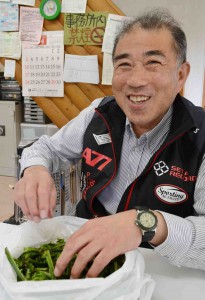Living in big cities like Tokyo really seems restless. Surrounded by concrete, people look as if they are constantly driven to do more. We suggest to such people to get away from the hustle and bustle of urban life and come to Ojiya to relax and listen to cuckoos sing. More and more people from urban areas are visiting the city to join such events as a harvest festival, a fireworks display and a walking event, and we feel the value of rural villages is increasingly being recognized.
Ojiya’s Wakatochi district is a village surrounded by mountains. In spring, trees in the mountains come into bud all at once. It is the best season for picking edible wild plants. In summer, you can see fireflies swirling over streams and ponds. In winter, we have lots of snow which accumulates in forests and becomes the source of water supply to rice fields.
All of these are a common sight in mountainous regions. That is why many of the residents here do not realize the value of rural living. On the contrary, they feel the place is inconvenient for shopping and they are fed up with shoveling the snow off their roof. I also used to feel a sense of inferiority living in a mountainous area.
I came to have a fresh look at the good points of the area when we were in the midst of restoring ourselves from the 2004 Chuetsu Earthquake. As aged farmers were left disheartened by damaged houses and rice paddies, being unable to resume farming, I suggested that we invite people from urban areas.
When the first group of college students arrived, the exclusionary atmosphere of the village was changed. When villagers saw the students’ smiles and heard them say “the mountain air feels so good” and “it’s relaxing to be surrounded by deep green forests,” they rediscovered the value of the area they live in and became confident of themselves. We now accept many elementary and junior high school students, as well as foreign trainees, to stay in farmhouses. Residents are looking forward to welcoming children and others, thinking about what they can do for them.
The villagers also invite elementary and junior high school students of Ojiya to stay for a night or two to eat, play and talk with them. Through such activities, the students learn the essence of life and to act on their own initiative. They learn not to act selfishly or be fussy. They start to look mature in a short period of time. Spending time in a rural village can exert a large educational effect on their development.
Our next goal is to foster industries and create employment so that people can earn their living in the area. We want to invite young people wishing to live in rural areas and let them lead a stable life here. In order to do so, we want to cultivate high-quality rice which can satisfy anyone, develop value-added products and work on branding the region itself.
<Born in 1952 in Niigata Prefecture, Tsuyoshi Hosogane was working for an agricultural cooperative JA Echigo Ojiya in the city of Ojiya, Niigata Prefecture, when a major earthquake hit the region in 2004. A founder and head of an organization working on restoring the city from the disaster, Hosogane talks about how their efforts to invite people from urban areas led themselves to realize the benefits of rural living.>


